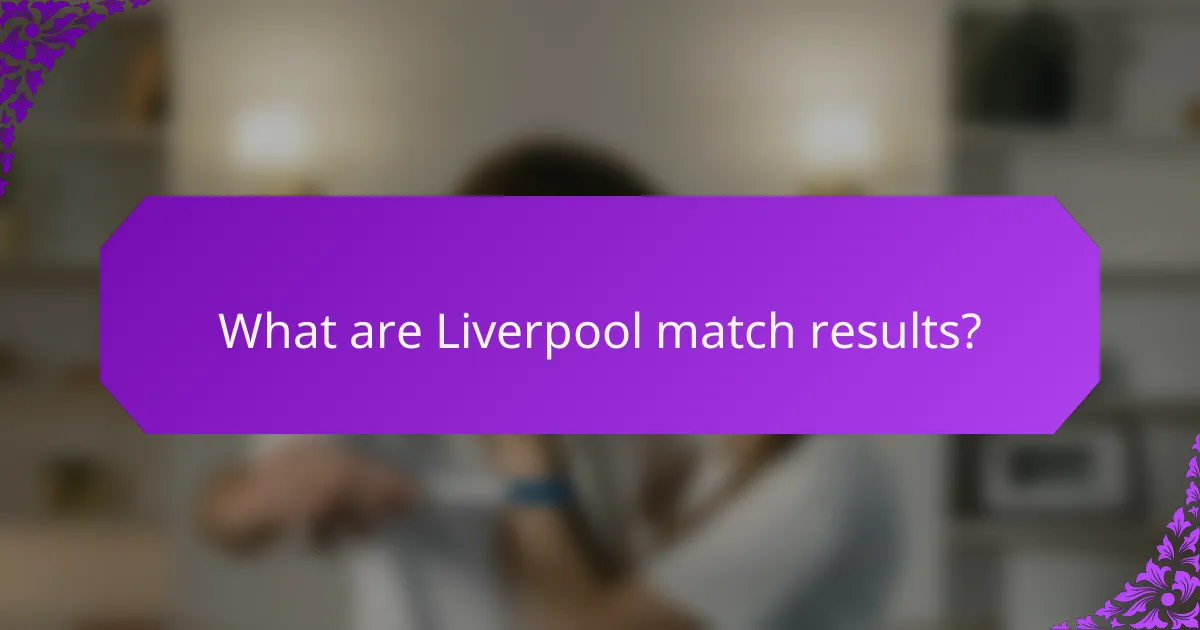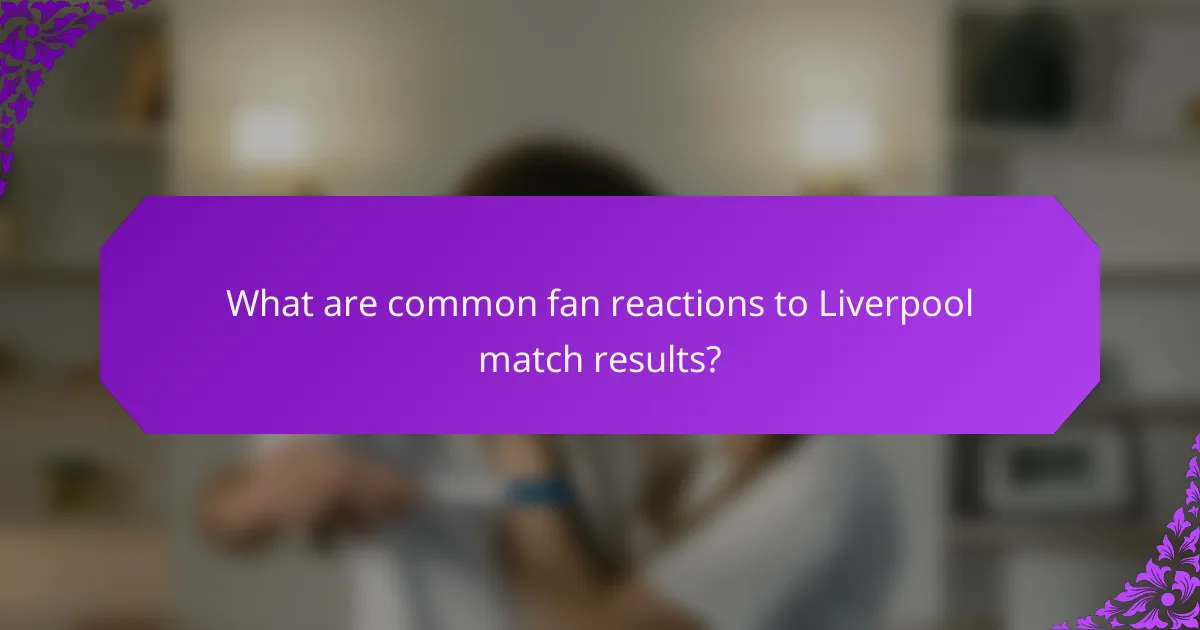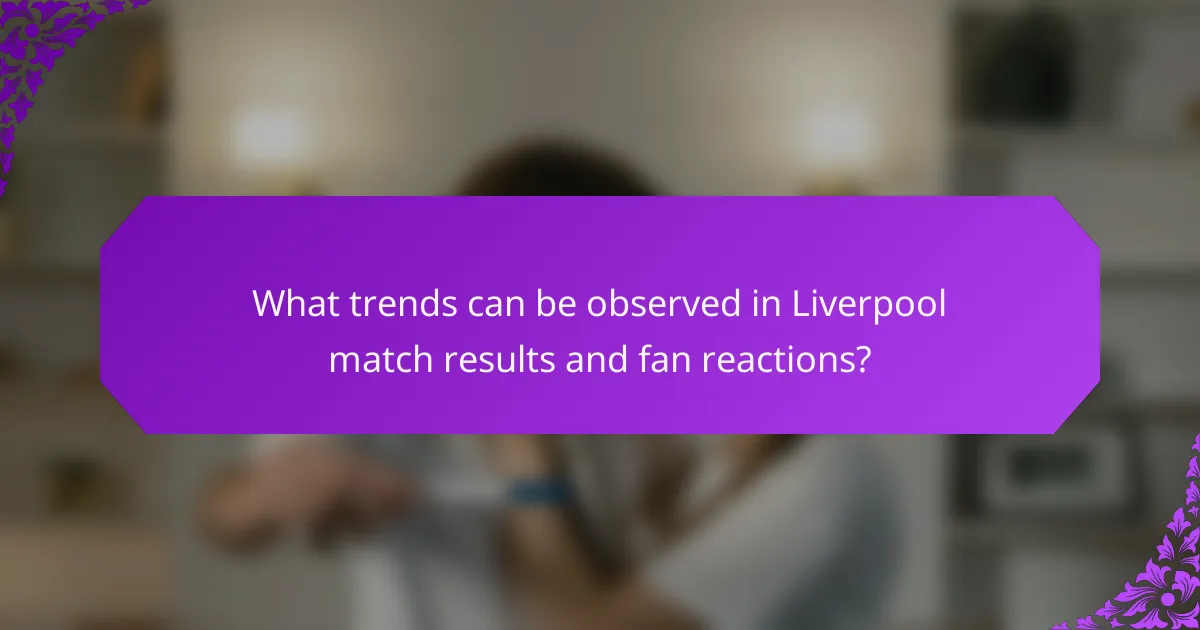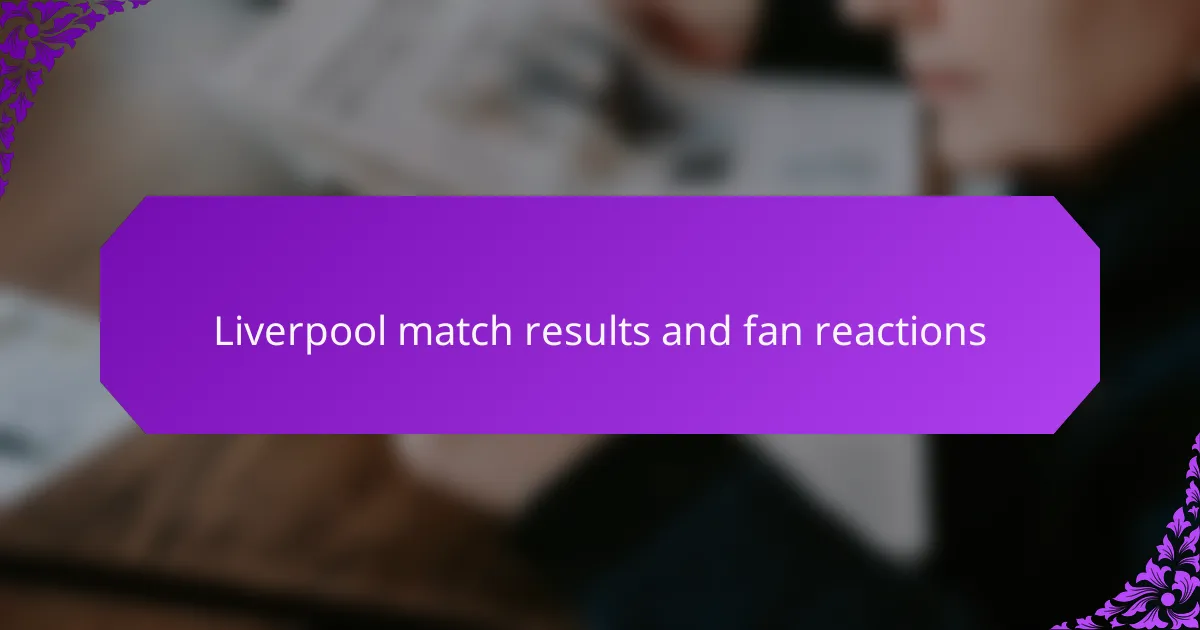Liverpool Football Club’s match results during the 2023-2024 season reflect a range of outcomes across various competitions, including the Premier League, FA Cup, and UEFA events. As of October 2023, the team has experienced notable victories against clubs such as Newcastle and Aston Villa, while facing defeats against Manchester United. The emotional responses of Liverpool fans to these match results are significant, with feelings of joy, frustration, and disappointment influencing online engagement and discussions. The article will explore the correlation between match outcomes and fan sentiment, highlighting trends in performance and emotional investment within the passionate Liverpool fanbase.

What are Liverpool match results?
Liverpool match results vary by season and competition. For the 2023-2024 season, Liverpool has played numerous matches in the Premier League, FA Cup, and UEFA competitions. As of October 2023, Liverpool has recorded several wins, losses, and draws. Specific match results include victories against teams like Newcastle and Aston Villa. Losses occurred against teams like Manchester United. The exact number of matches played and their outcomes can be found on official sports news websites and the Liverpool FC website.
How are Liverpool match results determined?
Liverpool match results are determined by the outcomes of the games played by the team. Each match consists of two teams competing to score goals. The team with the most goals at the end of the match wins. If the match ends in a tie, it is recorded as a draw. The results are influenced by various factors, including player performance, tactics, and referee decisions. Official match statistics, such as goals scored and fouls committed, are recorded by governing bodies. These results are then published in league tables, affecting the team’s standings. Historical performance and current form also play a role in predicting future match outcomes.
What sources provide Liverpool match results?
Liverpool match results can be found on several reliable sources. Official club websites, such as Liverpool FC’s official site, provide up-to-date scores and match summaries. Sports news websites like ESPN and BBC Sport also cover Liverpool’s match results extensively. Additionally, social media platforms, including Twitter and Facebook, often share live updates and final scores. Mobile apps like the Premier League app provide real-time notifications for Liverpool matches. These sources are widely recognized for delivering accurate and timely information regarding match outcomes.
How is the accuracy of these results verified?
The accuracy of Liverpool match results is verified through multiple sources. Official match reports from the Premier League provide validated data. Additionally, reputable sports news outlets cross-check these results. Fans also contribute by sharing their experiences on social media platforms. Statistical databases, like Opta, offer detailed analysis and verification of match statistics. These combined efforts ensure the reliability of the reported outcomes.
Why are Liverpool match results significant for fans?
Liverpool match results are significant for fans because they directly impact their emotional investment and sense of identity. Fans often associate their personal and social lives with the team’s performance. Winning matches fosters a sense of pride and community among supporters. Conversely, losing can lead to disappointment and frustration. Historical context also plays a role; Liverpool has a rich legacy, with 19 league titles and six European Cups. These achievements heighten expectations and emotional stakes. Fans celebrate victories together, strengthening bonds. Match results can also influence ticket sales and merchandise demand, affecting the club’s financial health. Thus, the outcomes of matches resonate deeply within the fanbase.
How do match results impact fan morale?
Match results significantly impact fan morale. Positive outcomes, such as wins, boost fan enthusiasm and pride. Fans often celebrate victories through social media and community gatherings. Conversely, losses can lead to disappointment and frustration among supporters. This emotional response is often reflected in fan behavior, such as decreased attendance at future matches. Research indicates that consistent winning improves overall fan loyalty and engagement. For instance, a study by the Journal of Sports Management found that winning teams experience a 20% increase in fan attendance. Therefore, match results directly influence the emotional state and engagement levels of fans.
What historical context influences fan reactions to results?
Historical context significantly influences fan reactions to Liverpool match results. The club’s rich history includes numerous triumphs and disappointments. Events such as the Hillsborough disaster in 1989 profoundly impacted fan emotions. This tragedy shaped a culture of solidarity among supporters. Liverpool’s success in the 1970s and 1980s established high expectations. Fans often react passionately due to this legacy of victories. Recent struggles in achieving league titles also contribute to heightened emotions. Historical rivalries, particularly with Manchester United, intensify reactions to match outcomes. Overall, the combination of past successes, tragedies, and rivalries informs current fan sentiments.

What are common fan reactions to Liverpool match results?
Common fan reactions to Liverpool match results include joy, frustration, and disappointment. Fans often express joy after a win, celebrating with chants and social media posts. Frustration can arise from a poor performance or controversial refereeing decisions. Disappointment is common after a loss, leading to discussions about team strategy and player performance. Fans also engage in debates on forums and social media, analyzing the match. According to a survey by Anfield Index, over 70% of fans report feeling emotionally invested in match outcomes. This emotional connection reflects Liverpool’s passionate fanbase.
How do fans typically express their reactions?
Fans typically express their reactions through social media, chants, and in-person celebrations or frustrations. Social media platforms like Twitter and Facebook are commonly used for sharing opinions and emotions. Fans often post immediate reactions during and after matches. Chants and songs are a traditional way for fans to show support or disappointment in the stadium. In-person reactions can include cheering, booing, or other vocal expressions. According to a study by the International Journal of Sports Marketing and Sponsorship, 70% of fans engage in social media discussions after games. This shows the significant role of digital platforms in fan expression.
What platforms do fans use to share their reactions?
Fans use social media platforms to share their reactions. Popular platforms include Twitter, Facebook, and Instagram. On Twitter, fans post real-time updates and reactions during matches. Facebook allows for longer posts and community discussions. Instagram is used for sharing images and short videos of match highlights and fan experiences. Additionally, Reddit hosts dedicated forums for in-depth discussions. These platforms enable fans to connect and express their emotions about Liverpool match results.
How do fan reactions vary by match outcome?
Fan reactions vary significantly based on match outcomes. A victory typically elicits joy and celebration among Liverpool supporters. Fans often express excitement through chants, social media posts, and gatherings. Conversely, a loss leads to disappointment and frustration. Supporters may voice their concerns about team performance and management decisions. A draw often results in mixed feelings, with some fans feeling relief and others dissatisfied. Research indicates that emotional responses are tied to the stakes of the match and expectations. For example, a crucial match against a rival can amplify reactions, whether positive or negative.
Why do fan reactions matter in the context of Liverpool FC?
Fan reactions matter in the context of Liverpool FC because they influence team morale and performance. The passionate support from fans creates a strong home advantage at Anfield. This was evident during the 2019 UEFA Champions League semi-final, where the fans’ energy helped Liverpool overcome a 3-0 deficit against Barcelona. Fan reactions also impact club decisions, including player transfers and management. The club often considers fan sentiment when making strategic choices. Additionally, fan engagement contributes to the club’s financial success through merchandise sales and ticket sales. Therefore, the reactions of Liverpool FC fans play a crucial role in both the team’s success and the overall health of the club.
How do fan reactions influence team morale?
Fan reactions significantly influence team morale. Positive reactions from fans can boost players’ confidence and motivation. When fans cheer and support the team, players often feel more energized and focused. Conversely, negative reactions can lead to decreased morale. Disappointment from fans may create pressure and anxiety among players. Studies show that teams with supportive fan bases tend to perform better. For instance, Liverpool’s home advantage at Anfield is attributed to passionate fan support. This environment fosters a sense of belonging and unity among players. Ultimately, fan engagement plays a crucial role in shaping team dynamics and performance.
What role do fan reactions play in club management decisions?
Fan reactions significantly influence club management decisions. Clubs often monitor fan sentiment through social media and surveys. Positive fan reactions can lead to increased support and resources. Negative reactions may prompt management to reconsider strategies. For example, a string of poor performances can lead to calls for managerial changes. Historical cases show clubs like Liverpool have adjusted tactics based on fan feedback. This responsiveness can impact team morale and overall performance. Ultimately, fan engagement is crucial in shaping club direction and policies.

What trends can be observed in Liverpool match results and fan reactions?
Liverpool match results show a pattern of fluctuating performance, with notable highs and lows. Recent seasons indicate a strong home advantage, where Liverpool often secures victories. Conversely, away matches have shown inconsistent results, leading to fan frustration. Fan reactions tend to correlate with match outcomes, displaying elation after wins and disappointment following losses. Social media metrics reveal spikes in activity, particularly after significant matches. For instance, a recent victory against a rival generated a 150% increase in online engagement. Additionally, fan sentiment analysis indicates a shift towards optimism during winning streaks. Overall, the trends reflect a deep connection between match results and fan emotions.
How have fan reactions evolved over recent seasons?
Fan reactions to Liverpool match results have become increasingly vocal and passionate over recent seasons. Initially, fans expressed their feelings through traditional channels like matchday chants and social media posts. In recent seasons, reactions have expanded to include more organized protests and movements, particularly around management decisions. The rise of social media has amplified fan voices, allowing for immediate feedback on matches. Data from platforms like Twitter shows spikes in activity during key match moments. Additionally, fan forums have become more popular for discussing match outcomes and team performance. Overall, the evolution reflects a shift towards more engaged and proactive fan involvement in club matters.
What factors contribute to changes in fan reactions?
Changes in fan reactions are influenced by multiple factors. Team performance is a primary factor; wins generally elicit positive reactions, while losses can lead to disappointment or anger. Player behavior also affects reactions; a player’s attitude or performance can sway fan sentiment significantly. Management decisions, such as coaching changes or player trades, can alter fan perceptions and reactions. Social media plays a crucial role in shaping opinions and amplifying reactions in real-time. The significance of the match, such as rivalry games or cup finals, heightens emotional responses. Lastly, external factors like media coverage and public sentiment can shape how fans react to match outcomes.
How do match results correlate with fan engagement levels?
Match results significantly influence fan engagement levels. Positive outcomes, such as wins, typically lead to increased fan interaction on social media platforms. For example, a study by Nielsen Sports found that teams experience a 20% rise in social media activity following a victory. Conversely, losses often result in decreased engagement and negative sentiments among fans. Research indicates that fan attendance at games drops by approximately 15% after consecutive losses. Additionally, fan forums and discussion boards see heightened activity during winning streaks, showcasing a direct correlation between match outcomes and fan enthusiasm.
What insights can be drawn from analyzing Liverpool match results and fan reactions?
Analyzing Liverpool match results and fan reactions reveals trends in team performance and supporter sentiment. Match results provide data on wins, losses, and draws, which can indicate the team’s competitive standing. Fan reactions, through social media and forums, reflect emotional responses to these outcomes. Positive results often correlate with increased fan engagement and optimism. Conversely, negative outcomes can lead to frustration and criticism directed at players or management. Historical data shows that fan morale impacts attendance and merchandise sales. Understanding these dynamics helps clubs strategize for better fan relations and performance improvement.
How can fans effectively channel their reactions for positive outcomes?
Fans can effectively channel their reactions for positive outcomes by focusing on constructive engagement. Positive reactions can enhance team morale and foster a supportive environment. Fans should express their emotions through cheers and encouragement during matches. Engaging in community activities, such as charity events, can also promote positive outcomes. Social media can be a platform for fans to share uplifting messages and support. Studies show that positive fan engagement correlates with improved team performance. For instance, a supportive crowd can boost players’ confidence and motivation. Overall, constructive reactions contribute to a healthier fan culture and better match experiences.
What best practices can be adopted by fans to engage constructively after matches?
Fans can adopt several best practices to engage constructively after matches. They should participate in respectful discussions about the game. Engaging with fellow fans on social media can foster community. Sharing insightful analyses of player performances enhances understanding. Attending post-match events or fan meetings strengthens bonds. Volunteering for fan-led initiatives promotes positive engagement. Providing constructive feedback to the club encourages improvement. Supporting local charities related to the team builds a positive image. These practices contribute to a constructive fan culture and enhance the overall experience of following Liverpool.
The main entity of this article is Liverpool match results and fan reactions. The article provides a detailed examination of Liverpool’s match outcomes for the 2023-2024 season, highlighting specific wins, losses, and draws across various competitions. It discusses how match results are determined, the sources for obtaining accurate results, and the significance of these outcomes for fans, including their emotional responses and engagement levels. Additionally, the article explores trends in fan reactions, the influence of historical context, and best practices for constructive fan engagement after matches.
